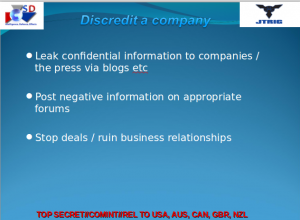Sure, sure, they did that terrible thing.
I mean, they may have. But this is how the NSA discredits people like hacktivists. This is their training:
Lovely.
And this is how they discredit a company:
Punishment without trial. Note that altering photos and faking emails is fraud.
Though this article doesn’t go into it, I also strongly presume that they have uploaded kiddie-porn onto victims’ computers. The malware, key loggers, and backdoors to which the NSA has access often make it possible for them to not only to see what’s on your computer, but to take control of it.
The hidden state, not to put too fine a point on it, is at war with a good chunk of society. Greenwald, being practically a hacktivist himself, is concerned with their war on hacktivists, but they also go after a wide variety of targets, including war protesters, environmentalists, unions, and left-wingers in general.
Though not new, this does seem to have become worse in the last 25 years or so. It is of a piece with no-fly lists and treasury designations of criminal or terrorist individuals and organizations, which is to say, it is administrative punishment without appeal or transparency. You often don’t know who’s doing it to you, why they are doing it to you, or how to get it to stop; and you certainly were never accused of a crime and given your day in court.
These sorts of actions destroy lives. The people who perpetrate them cause poverty, unemployment, failed businesses, and, ultimately, in the fallout from these, violence, illness and death (as all follow from lack of money and social isolation).
In other words, all of these actions should be considered criminal acts. Some of them probably still are, by the strict letter of the law.
Next time some radical hero is accused of being nasty, consider carefully how credible it really is. Perhaps apply to life that general principle of benefit of the doubt.
The left, in particular, is always easy to split along markers of social identity, and don’t think the NSA and other similar agencies don’t know that, and use it.
Read the entirety of Greenwald’s post. It is important.


